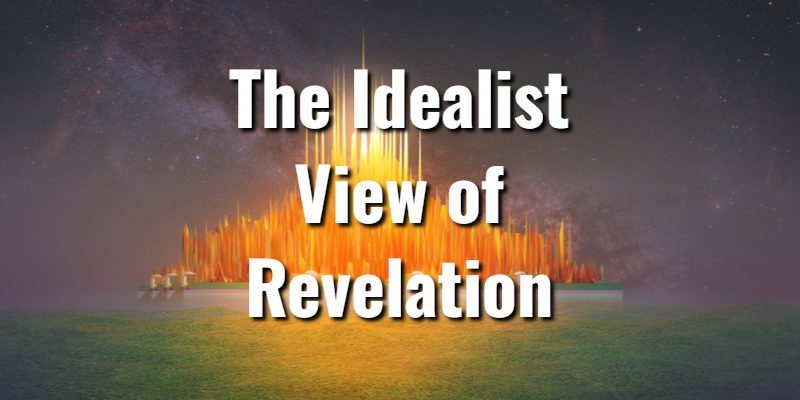The Idealist view of the Book of Revelation is an interpretive approach that interprets the text symbolically rather than seeking specific historical or future fulfillments. Proponents of this viewpoint argue that the book serves as an allegory for the ongoing spiritual struggle between good and evil, the triumph of God, and the ultimate victory of righteousness. The Idealist approach often focuses on the moral and ethical lessons that can be drawn from the book. This approach contrasts with other interpretive methods for Revelation. Representing one of the most common of the different views, Christians who subscribe to the Idealist view of Revelation often cite the below Bible verses.
The Idealist View of Revelation
Idealist View of Revelation: Key Bible Verses
Key Bible verses:
- Revelation 1:1: “The Revelation of Jesus Christ, which God gave unto him, to shew unto his servants things which must shortly come to pass.”
Idealists interpret the phrase “shortly come to pass” as indicating the immediacy of the book’s message, emphasizing its relevance to all generations.
- Revelation 12:1: “And there appeared a great wonder in heaven; a woman clothed with the sun, and the moon under her feet, and upon her head a crown of twelve stars.”
Idealists see this vision of a woman as a symbol of the church, representing the people of God throughout history.
- Revelation 13:1-2: “And I stood upon the sand of the sea, and saw a beast rise up out of the sea, having seven heads and ten horns, and upon his horns ten crowns, and upon his heads the name of blasphemy. And the beast which I saw was like unto a leopard, and his feet were as the feet of a bear, and his mouth as the mouth of a lion: and the dragon gave him his power, and his seat, and great authority.”
The depiction of a beast rising from the sea with ten horns and seven heads is interpreted symbolically, with the beast representing evil powers throughout history and the horns and heads signifying various manifestations of these powers.
- Revelation 21:1-2: “And I saw a new heaven and a new earth: for the first heaven and the first earth were passed away; and there was no more sea. And I John saw the holy city, new Jerusalem, coming down from God out of heaven, prepared as a bride adorned for her husband.”
The vision of a new heaven and a new earth, with the holy city, New Jerusalem, coming down from heaven, is seen by Idealists as a symbol of the ultimate triumph of God’s kingdom over all evil.
- Revelation 22:1-2: “And he shewed me a pure river of water of life, clear as crystal, proceeding out of the throne of God and of the Lamb. In the midst of the street of it, and on either side of the river, was there the tree of life, which bare twelve manner of fruits, and yielded her fruit every month: and the leaves of the tree were for the healing of the nations.”
The river of the water of life and the tree of life in the final chapter are interpreted as symbols of God’s eternal blessings and the spiritual sustenance available to believers.
Lord's Library is a Christian resource hub. Our editors use a variety of internet research methods like search engines, audio and video, AI, consultations with ministry leaders in the field, and more. Lord's Library should never be a substitute for reading your Bible daily as the Scriptures are to be our final authority on all matters. Lord's Library participates in affiliate programs. We may make a small commission from products purchased through this resource.
- What Does the Bible Say About Discernment? With Key Scriptures - July 19, 2024
- What Does the Bible Say About Disobedience? With Key Scriptures - July 19, 2024
- 1 Timothy 1:12 Meaning: Commentary on an Important Scripture - July 11, 2024













